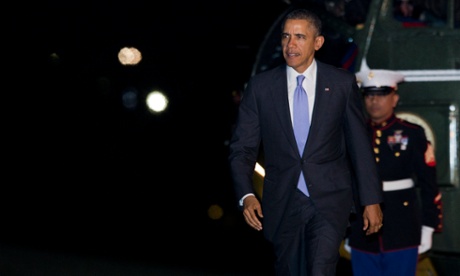Obama will meet Xi Jinping of China in attempt to isolate Russia over Ukraine
• White House extends president's overseas schedule
• Rice: 'US is leading in supporting government of Ukraine'
• Rice: 'US is leading in supporting government of Ukraine'
The White House has added meetings with the leaders of China and Japan to Barack Obama's visit to Europe and Saudi Arabia next week, as it seeks to use the six-day trip to build an international coalition and isolate Russia over its annexation of Crimea.
Amid criticism that Washington has sent weak signals about international resolve over the crisis, national security adviser Susan Rice announced on Friday that the flurry of diplomatic action – including hastily-arranged G7 and Nato meetings – was an opportunity to prove the US can continue to provide global leadership on a host of vexed issues.
“Over the course of this trip, the president will be mobilising the international community and some of our most important partners in the world at a time when we are dealing with a number of challenges,” Rice said in an unusual public briefing with reporters.
“If there is a common theme to this trip, it is the fundamental strength and importance of our alliances and partnerships,” she added. “The strategic importance of this effort really cannot be overstated; from Europe, to Asia and the Middle East, our ability to lead strong coalitions is essential to making progress.”
Despite fears that the Ukrainian crisis marks a return to a Cold War-style standoff between East and West, the White House had drawn succour from a Chinese decision to to abstain rather than vote with Russia during a United Nations vote condemning events in Crimea last Sunday.
Obama will meet president Xi Jinping in the Hague on Monday on the sidelines of a wider summit on combating nuclear terrorism. Michelle Obama and her two daughters are currently on a visit to China that is billed as a form of “soft diplomacy” by the White House, which is anxious to lure Beijing away from its historic support of Moscow.
There are also now US bilateral meetings scheduled next week with the leaders of the Netherlands, Italy, Belgium and the United Arab Emirates as well as a trilateral meeting with the leaders of South Korea and Japan; an audience with the Pope in Rome; and a flying visit to meet the king of Saudi Arabia.
Washington's attempt to prove that the era of pax-Americana is not over yet comes after it ramped up financial sanctions against Russia on Thursday – blacklisting wealthy oligarchs close to Putin and threatening a wider economic trade blockade.
This has prompted a downgrade of Russian debt by international credit rating agencies and a slide in the ruble, but to be effective the economic warfare needs support from larger trading partners in Europe and Asia.
The White House is also anxious that the dramatic slide in relations with the Kremlin does not derail fragile progress in the Middle East, where a nuclear deal with Iran and peace talks with Syria depend on continued Russian support.
Nevertheless, the National Security Council is quick to acknowledge that events in Ukraine have led to a major rethink of policy towards Moscow and this crisis will dominate the president's trip to Europe and the Gulf.
“These meetings take place against the backdrop of Russia's intervention in Ukraine,” said Rice. “What will be clear for the entire world to see is that Russia is increasingly isolated and the US is leading the international community in supporting the government of Ukraine and imposing costs on Russia.”

No comments:
Post a Comment
Comments always welcome!